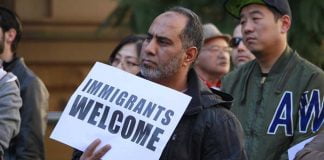SBS TV’s Go Back To Where You Came From has generated a huge amount of public debate about refugees. It was the highest-rating program for SBS so far this year, with over half a million viewers tuning in for each episode.
It followed six people sent on a journey to retrace the steps refugees make from their homes to get to Australia. In what they described as a “social experiment”, the show’s producers selected people with some of the most shocking anti-refugee attitudes they could find.
Producers attended the community meeting for residents living near the Inverbrackie Detention Centre in the Adelaide Hills. Here they found Raye Colbey, the “loudest most virulently anti-detention centre person at the meeting”. Raye starts off viciously racist towards refugees in the first episode, saying, “I could have gone over there with a gun and shot the lot of them”.
Then there is Raquel, who openly admits to being racist and says, “I just don’t like Africans”.
The most striking thing about the show is the immense empathy that direct experience of refugees’ despair draws, even from these self-described racists.
Most of the participants’ dramatically shift their opinion as a result of the journey. This is the most important lesson of the series—that people’s ideas can be changed. And it is not just five people’s ideas about refugees that it has changed—as we’ve seen in the discussion around the show. This will be an important source of hope to refugee rights campaigners in the fight to shift public opinion.
Conditions
The series has helped expose conditions for refugees in Malaysia, where Gillard plans to deport 800 people as part of her “Malaysia solution”.
Participants traveled there to spend time living in an overcrowded apartment with 40 Burmese refugees.
These refugees are essentially stuck in limbo. Adults only dare to work on the fringes of the city in backbreaking jobs while their children are afraid to venture outside for fear of being taken away.
The experience poses a question: would you get on a boat, if it was your only hope of freedom and opportunities. Adam, a lifeguard from Cronulla who took part in the Cronulla race riot and earlier called refugees “criminals”, is moved to acknowledge that he would get on a boat if faced with their choice.
The show also brings to light the desperate situations that refugees flee. The participants’ meet an African family recently settled in Australia, who fled political persecution in the Congo. Later they make the journey to where their relatives are still stuck in a refugee camp.
Living alongside refugees in a Kenyan camp that houses 84,000 refugees, the participants get an insight into the poverty and despair refugees face.
Even Raquel ends up sympathising with the plight of this family having fled from political persecution and now stuck in a camp. She sees how they live in brute poverty and shares their sadness in not being able to see their relatives in Australia.
The situation of these two families—one living in Australia and another still stuck in a camp—also highlights the arbitrariness of whether refugees ever get the chance of resettlement.
But empathy with refugees’ suffering is not enough to see through all the racist myths. Raye, who spent time living in the African refugee camp, has shown since that she remains hostile to the refugee boats. Her conclusion has been that the most “deserving” refugees are in these camps, while those who come by boat are jumping the queue and “undeserving”, as she argued on a recent episode of Q&A.
But not everyone gets the chance to wait in a camp. People fleeing war zones like Sri Lanka or the Middle East have no where to apply and no queue to join. The millions of African refugees compared to meager refugee intake levels by developed counties also shows the fallacy of the idea of an orderly queue. Without getting on a boat most refugees will remain in these camps without any hope of resettlement.
Go Back To Where You Came From shows how racist ideas are built on myths pushed by the government and the media. The series demonstrates how these myths can be broken down through learning about the situation of refugees. Meeting refugees can be part of the movement but a campaign working to shift public opinion is neded to end racist refugee policies.
Alongside telling these stories in workplaces, schools and universities, we need to mobilise the power of ordinary people on the streets to force an end to our government’s racist treatment of refugees.
By Feiyi Zhang





